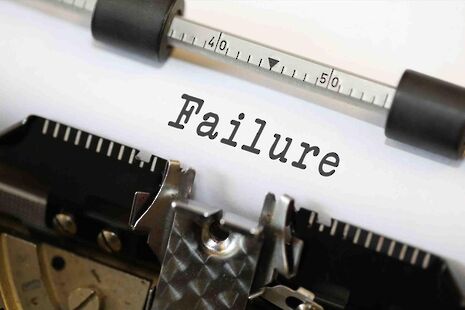How to look past rejection
Getting ‘no’ upon ‘no’ as an answer to job applications can be gruelling, but there are ways to make it better

When I started applying for graduate jobs, a strange and not-at-all welcome thing began to happen to me: I got rejected. This wasn’t a surprise, rationally – companies tend not to want to hire you when the majority of your cover letter tries to claim that a background in nursery work makes you the ideal candidate for a publishing job. But as the emails piled up, in an inbox folder appropriately titled ‘Unwanted’ (“I’m sorry to say…”, “we regret to inform you…”), the sense of rejection got disproportionately difficult to bear. I wonder how many other ex-overachievers go through the same thing upon finding themselves suddenly underqualified.
The idea that Cambridge students are naïve, entitled and sheltered from the real world is one which, for the most part, I’d love to disprove. But here’s the (incredibly) ugly truth: I’d be lying if I said that a tiny part of my disappointment didn’t arise from a dangerously misplaced sense of expectation. I’d also be lying if I said that I don’t sometimes take rejection personally. Trying to find a graduate job is a bit like starting university for the first time: all over again, the thing on which I’ve principally pinned my sense of self-worth – being moderately bright – was shown to be nothing much to write home about after all.
All over again, the thing on which I’ve principally pinned my sense of self-worth – being moderately bright – was shown to be nothing much to write home about after all
There are several things wrong with this way of thinking. It’s natural to fear rejection, of course, but I realised recently that in constantly trying to protect myself from it, I’ve potentially missed out on a lot of opportunities. I spent Week One of first year, à la Harry Potter, in my room making no noise and pretending I didn’t exist. I never got involved with the creative writing societies at Cambridge. I’ve only ever asked one person out on a date. By taking rejection personally, we make the stakes so high that regret seems a safer option that rejection. But in doing this, we do ourselves a disservice.
Treat rejections as success
I know ‘success’ seams an incongruous word to pair with one for which the Oxford English Dictionary lists “the expulsion of a substance from the body, esp. by vomiting” as a definition. But adopting this outlook has been one of the healthiest decisions I’ve made this year. A few months ago, my mum recalled listening to a radio programme in which the writer being interviewed claimed that she aimed to get 100 rejections of her work in a year – the logic behind this being that by removing the fear of failure, she was more eager to submit to competitions and publications that she thought were likely to turn her down. The more things she applied to, the more she got accepted. While applying indiscriminately to jobs, internships, or work experience placements probably isn’t worth your time – or that of the employer – the philosophy of stacking up rejections like awards does take off a lot of the pressure.
Remember to value your ‘non-employable’ skills
Writing a CV can be a peculiarly demoralising experience. Regardless of how much you have to write about, reducing 20 years of your life into a series of bullet points seems formulaic and impersonal. If you define yourself by your achievements, a CV will only reinforce that – so it’s a refreshing idea every now and then to take stock of the qualities which might not necessarily make you a good candidate, but which do make you a good person. Amongst these qualities, you can count proactivity – being rejected from an opportunity doesn’t change the fact that you were resourceful enough to apply in the first place.
Prioritise what’s most important to you and be adaptable
This year, I’m missing May Week to go and do work experience in London. It wasn’t necessarily an easy decision to make – it means I’m missing out on my final May Ball, a celebration generally considered the highlight of Cambridge – but I’m excited enough about the placement (for excited, read: excited but terrified) that this makes it completely worth it for me. Being adaptable not only encourages you to rearrange things to make the impractical practical, but also makes it easier to deal with rejection – after all, every time your application is turned down, you get to reassess the situation and go for an opportunity that could be even better.
 Features / How sweet is the en-suite deal?13 January 2026
Features / How sweet is the en-suite deal?13 January 2026 Comment / Will the town and gown divide ever truly be resolved?12 January 2026
Comment / Will the town and gown divide ever truly be resolved?12 January 2026 News / 20 vet organisations sign letter backing Cam vet course13 January 2026
News / 20 vet organisations sign letter backing Cam vet course13 January 2026 Arts / Fact-checking R.F. Kuang’s Katabasis13 January 2026
Arts / Fact-checking R.F. Kuang’s Katabasis13 January 2026 Music / Inside Radiohead’s circle13 January 2026
Music / Inside Radiohead’s circle13 January 2026









